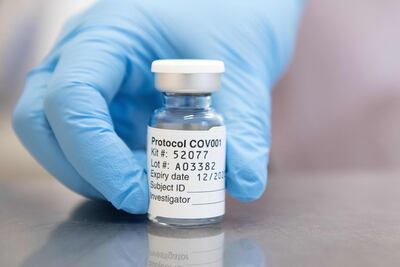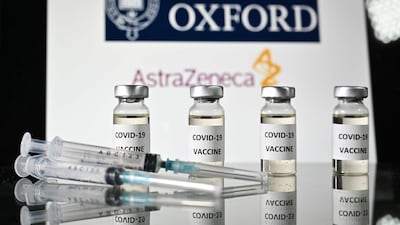The head of drug maker AstraZeneca on Sunday said that researchers believe the shot will be effective against a new variant of the virus, which is driving a surge in infections in Britain.
The company has developed a coronavirus vaccine widely expected to be approved by UK authorities this week.
Researchers developing its vaccine have figured out a "winning formula", making the vaccine as effective as those from rivals, AstraZeneca chief executive Pascal Soriot told The Sunday Times.
Some have raised concern that the AstraZeneca vaccine, which is being developed with the University of Oxford, may not be as good as Pfizer's, which is already being distributed in the UK and other countries.
Partial results suggest the AstraZeneca shot is about 70 per cent effective in preventing illness from the coronavirus, compared to the 95 per cent efficacy reported by Pfizer and its German partner BioNTech.
“We think we have figured out the winning formula and how to get efficacy that, after two doses, is up there with everybody else,” Mr Soriot said.
“I can’t tell you more because we will publish at some point.”
Britain’s government says its medicine regulator is reviewing the final data from AstraZeneca’s Phase-3 clinical trials.
The Times and others have reported that approval could come by Thursday, and the vaccines could start to be distributed for the UK public in the first week of January.

“So far, we think the vaccine should remain effective [with the new variant coronavirus]," Mr Soriot said. "But we can’t be sure, so we’re going to test that.”
British authorities have blamed the new variant for soaring infection rates across the country.
They said the variant was much more transmittable, but stress there was no evidence that it made people more ill.
UK Prime Minister Boris Johnson sounded an alarm about the variant days before Christmas, saying it was spreading rapidly and that plans to travel and gather must be cancelled for millions to curb its spread.

Authorities have since put increasing areas of the country – affecting about 24 million people or 43 per cent of the population – under the strictest level of restrictions.
Non-essential shops have closed, restaurants and pubs can only operate for takeout and indoor socialising is not allowed.
Many countries swiftly barred travel from the UK, but cases of the new variant have since also been reported in a dozen locations around the world.
Public health officials said on December 24 that more than 600,000 people had received the first of two doses of the Pfizer vaccine.
Britain recorded another 30,501 positive Covid-19 cases and a further 316 fatalities on Sunday, bringing the country’s total death toll to 70,752.
Many hospitals are under pressure, including the largest in Wales, which issued an urgent appeal on Saturday for healthcare staff or medical students to help care for coronavirus patients in intensive care.
The health board that runs University Hospital of Wales said on Sunday that the situation had improved but its critical care unit remained extremely busy.

